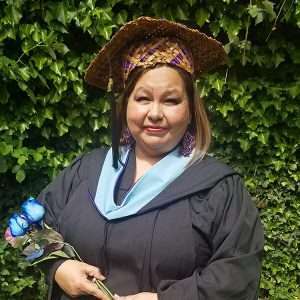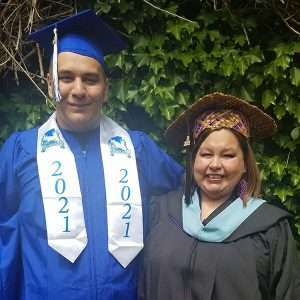Sealaska Scholarship Recipient Shares Her Commitment to Education with Her Family, Community
 Educator and Sealaska shareholder Karen Lauth Elliott has been celebrating a lot of graduations over the past few years, culminating on June 12 this year, when she and her youngest son, Emad Al-Shamasawi, both received diplomas on the same day. Elliott earned her master’s in education policy from the University of Washington (UW) that day while her son graduated from Ingraham High School in Seattle. Other graduations in her family in recent years include her bachelor’s degree in American Indian studies in 2020, as well as the high school graduations of her three older children in 2014, 2015 and 2019.
Educator and Sealaska shareholder Karen Lauth Elliott has been celebrating a lot of graduations over the past few years, culminating on June 12 this year, when she and her youngest son, Emad Al-Shamasawi, both received diplomas on the same day. Elliott earned her master’s in education policy from the University of Washington (UW) that day while her son graduated from Ingraham High School in Seattle. Other graduations in her family in recent years include her bachelor’s degree in American Indian studies in 2020, as well as the high school graduations of her three older children in 2014, 2015 and 2019.
Elliott followed in her father’s footsteps as a UW graduate. Fred Lauth, Sr. received his bachelor’s degree in business from UW in 1985.
Elliott was born in Ketchikan and raised in Saxman. Her family moved to the Seattle area in the early ‘80s. She works at Edmonds School District and gives time to Xaat’aay ‘Waadluwaan Gaagaay (All Nations’ Children) dance group in the Seattle area.
Elliott is a 2020-2021 Sealaska scholarship recipient. She is Tlingit, Yéil (Raven), Táakw.aaneidí. Her Tlingit name is Saxoon. She is also Haida. We talked with her about her educational career and goals.
Q: Tell us about your professional career in education?
I work for Edmonds School District Title VI Indian Education Program. I work with students and parents to develop Native programming to meet academic needs. My focus is high school graduation rates, with a goal of 100% while I am working for Edmonds School District.
I have worked for Daybreak Star Preschool family services. I have also volunteered my time with the Parent Advisory Board for Seattle Public Schools Title VII. I have served as secretary for Urban Native Education Alliance (UNEA). As Tlingit and Haida Washington Chapter Youth Chair, I developed summer culture programs for T&H youth, and I am on the education committee for our T&H Assembly. I have served as a Tlingit & Haida Washington chapter / Seattle community council delegate over the years since 1988.

Q: You come from a family of learners. Tell us about how that value was transmitted in your family.
My mother Marian (Peratrovich) Lauth from Klawock supported our education endeavors. She is the backbone of our family. My sister Carol received her bachelor’s degree from the University of Alaska Anchorage. My mentors growing up were Francis and Norma Jean Dunne, Jan Peele and Saddutes Peele.
Q: What inspired you to get into education, and specifically Native education?
I have always encouraged Native learners to seek higher education. I have been inspired by the Seattle Native Community. While working for Daybreak Star Preschool I found purpose to continue with my own educational goals. I have been an educator for years. I am ready to inspire others for education purposes.
Q: Why is the field of education important to you?
Education policies are important to bring a voice to Native education needs. I can use my expertise and voice with federal, state, local, and now tribal government educational policies to help dismantle laws that harm people. It’s time to bring relevant education for our Native learners to succeed in life.
Q: Where do you see yourself working, institutions or policy? What is your dream job?
I would love to work for my tribe in making education policies. I also am passionate about education equality to ensure Native students can meet their academic goals.
Q: If you could fix one thing within education, what would that be?
Title VI of the Civil Rights Act of 1964 protects people from discrimination based on race, color or national origin in programs or activities that receive Federal financial assistance. Title VI funding does not support the demanding academic needs for Native children. We all can support the success of Native students by supporting our families, student academics or mentoring students.
Q: Who was your favorite teacher and why?
My favorite teacher was at Valley Park Elementary in Ketchikan. Esther Shea was a respected matriarch of the Teikweidi (Brown Bear) clan in Ketchikan. She gave her time in and outside the classroom. We called her gram, and I learned the Tlingit language and culture from her.
About Sealaska’s Scholarship Program
Sealaska is dedicated to advancing the opportunities of our people through access to higher education and vocational training. The Sealaska scholarship program serves shareholders and descendants enrolled full or part time in vocational-technical programs and accredited colleges and universities. To date, Sealaska has awarded approximately 11,000 scholarships totaling $20 million. For full program information and eligibility requirements, please visit https://mysealaska-redesign.app.s360.is/Services/Scholarshi




 Back to Stories
Back to Stories



 Previous
Previous